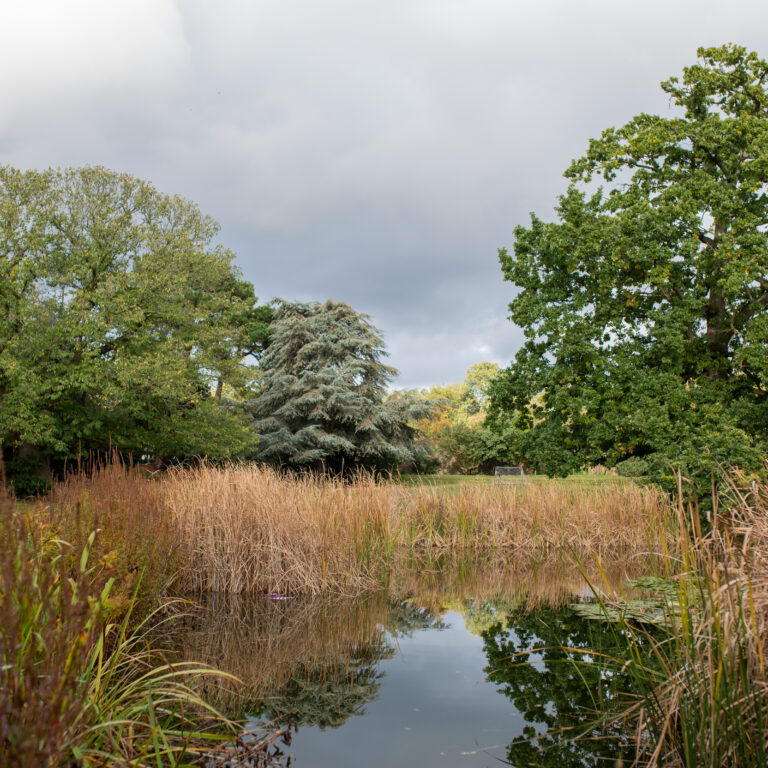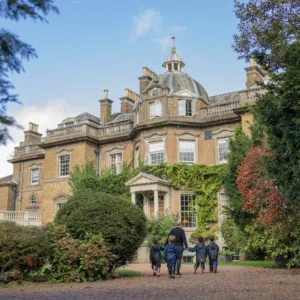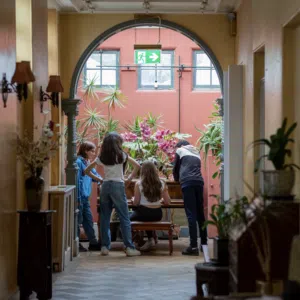In March 2024, Kate was delighted to be interviewed by Chloe Abbott, founder of Education Choices magazine, for their school heads podcast series.
How do you believe your previous experiences are contributing to your leadership of the school and your insight as Principal?
I have had an interesting and varied career. I’m not what one would call a ‘career head’; I haven’t worked all my life in schools – I’ve had the pleasure of working across lots of sectors and doing many different jobs, all focused on children, young people and education. It’s an absolute pleasure to be able to put all of my knowledge and experience into one school, focusing on the children and making sure that we value each child as an individual.
Our school is very much focused on the importance of relationships, allowing all children to find who they are, find their passion and fly. It’s also really important that Hampton Court House has a very small family-feel to our community, where it’s not just about our children, it’s about our parents and our staff. Hampton Court, as you know, is a very special place that combines both academic achievement with a small nurturing environment. I think that all of my past experiences in the wide variety of sectors that I’ve worked in contributes to my leadership role as Principal.
On the website, you describe Hampton Court House as embodying ‘achievement with heart.’ Could you explain to me what that means?
Hampton Court House is a unique place and has a unique approach to education – we’re small and we’re nurturing. All children are known, there’s no place to hide, but we’re a high-achieving school with high academic standards. For us, achievement with heart really embodied that, it was about thinking about the two things that mean a lot to us, including that personalised approach, really caring for the children.
I want all of my children and young people to bounce into school and to want to be here and to want to learn. We love and cherish all of our children’s individual gifts at Hampton Court House, but it’s through that underpinning of every child that our children fly, find their passion and achieve.
I’m absolutely blown away by some of their achievements: on average in GCSEs, 70% of our children – and just over 70% the year before – achieve A*s and As across the board. That’s a phenomenal achievement, especially because, while we are academically selective in Senior, our academic standards for that entry point are actually lower than most of the other schools in the area. That value-added aspect is what Hampton Court House brings to every child that joins our school.
So, we achieve with heart – or sometimes probably the other way around – we are heart with achievement, because it’s the heart, the nurturing, the love and celebration of each child’s individual gifts that allows them to reach their full academic potential.
Can you tell us a little bit more about the ethos and values at Hampton Court House?
When I think about Hampton Court House and our core, two things come to mind. The first one is when we think about the root word of education: there’s this debate about the root word of education, whether it’s the Latin word educare, meaning “to mould, to nurture, to fill up with knowledge”, or whether it’s the Latin word educere, meaning “to bring forth what is within.” “So, our whole approach is around enabling young people to feel confident, to find themselves, that sense of self-efficacy, that sense of self-awareness, to find their passion, and to really thrive!”
Most schools that I’ve worked with do the first one really well: they mould children, they have an enriching curriculum that can impart knowledge, they shape and care for young people, but very, very few schools actually do educere, which is to bring forth what is within. When I think about Hampton Court House, that’s the special bit that we do. Of course, we mould children, we’ve got an amazing curriculum, we feed them with knowledge, we nurture them, we care for them, but actually, what makes a difference in a young person’s life is bringing forth what is within. So, our whole approach is around enabling young people to feel confident, to find themselves, that sense of self-efficacy, that sense of self-awareness, to find their passion, and to really thrive!
As many people know, we are a non-school uniform school, we use first names and we have a relaxed approach to building relationships with young people, but it’s purposeful. It’s not random informality, it’s purposeful, enabling a relationship with our young people and our children, to create psychological safe spaces in classrooms so children feel that they can go beyond the curriculum and ask questions without worrying about their question being silly. They can move forward on every aspect of content for their curriculum, to embody the subject matters so that they can actually fly. At Hampton Court House, it’s about every single child, their individual gifts and how we can bring forth what is within every single child.
What are the main requirements and points of entry for children and families considering applying to Hampton Court House?
For us, it’s very much about the individual child. Of course, we have minimum entry standards and at our 11+ and 13+ pathways, it’s generally on the GL Assessment scale – about 110. We look for slightly above average, however it’s not just about exams at Hampton Court House, it’s about the individual. What we’re looking for is a young person who will thrive in our small, nurturing environment and who will want to contribute to our community.
What provision is there for the children that might be commuting from London?
We are just a short train ride away from Central London. We’re just over twenty minutes from Clapham Junction and 40 minutes from Waterloo. The commute into our beautiful parkland campus is really straightforward – you’re going from the centre of London, where it’s quite built-up, into what is almost the countryside.
Our children bounce into school. There’s an absolutely stunning campus where children can be free and spend time outside, either on the playing fields or playing in our beautiful grounds. We also have a bus service, offering both door-to-door and central pickup points, so for families wanting something a little bit more held, in particular for younger children, our bus service goes out and collects children from far and wide.
We’ve got families coming in from all over. Lower down the school we do have our French Immersion programme, so we also attract a large number of international families. I was speaking to one of our families the other day, and they said: “Kate, your school is like a global village school,” and I thought that was wonderful, and it is, it’s incredibly inclusive.
On the website, it states: ‘non-uniform parkland campus environment, in which staff and pupils alike are addressed on first-name basis, cultivates an energy where pupils grow in confidence and find themselves.’ How do you feel the children are able to benefit from this more informal environment?
Well, it is true that we have an extraordinary, beautiful parkland campus, but our approach is far more than that: it’s built around purposeful informality. I’m ‘Kate’, I’m not ‘Principal Trunchbull’, all of the teachers are known by their first names. The reason that we have that purposeful informality in our approach is to enable our children to feel like themselves and to feel supported and comfortable to learn.
The educationalists among us will know very well about the social pedagogy approach and we are very much aligned to that – it’s not about directing children, it’s about travelling with them on their educational journey, making sure that we’re there when they fall and we pick them up and put them back. It’s really about empowering them to own their learning, to make informed choices. It’s about creating that relationship with our children and young people so that they can succeed. I always go back to Guy Claxton’s model – when I was with him at the Dukes conference a couple of months ago, he had several different things he was talking about. I asked him: “Guy, if you were to pick one thing that had the greatest impact on young people in terms of their educational achievement, what would it be?” He replied: “Kate, it would be creating a psychological safe space in the classroom.” I was thrilled because I completely agree and that’s what we try to do at Hampton Court House – all of the various things that we do are purposeful in that approach.
What’s your vision for the future of Hampton Court House going forwards?
It’s really about making sure that we have a thriving academic community. All children are different; as a mum of three, I know that all children have different skills and gifts and for me it’s about valuing each and every child for who they are. It’s making sure that we take those unique gifts and talents and celebrate them together as a community. For us, it’s about focusing on what really matters.
Of course, we’re a school and education is at the heart of what we do, but for us at Hampton Court House, it’s about each individual child and making sure that we give them the best opportunity to be the best that they can be as an individual. Everybody contributes like a hive of bees to a community in a purposeful way, so we end up with a beautiful, thriving academic community full of individuals.
“Everybody contributes like a hive of bees to a community in a purposeful way, so we end up with a beautiful, thriving academic community full of individuals.”
Click here to listen to the full podcast.


